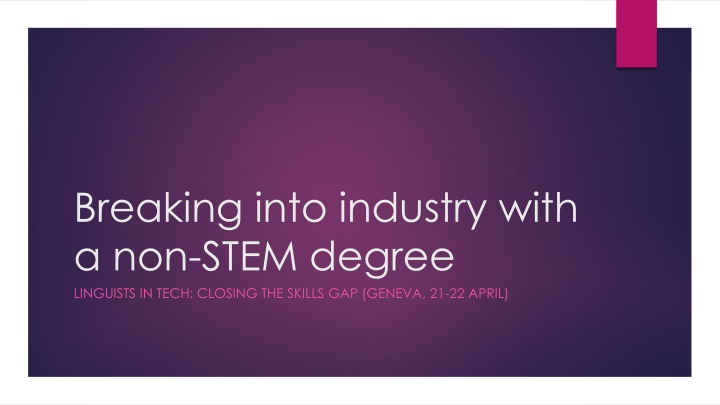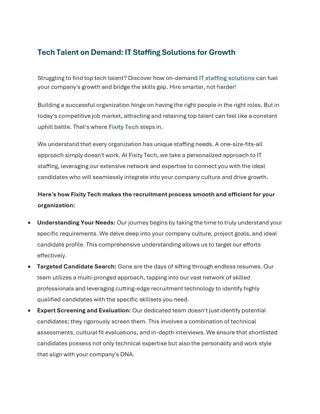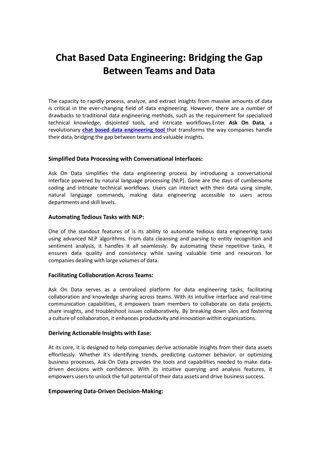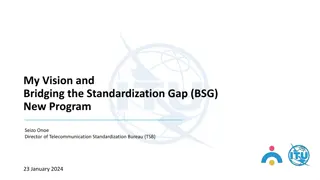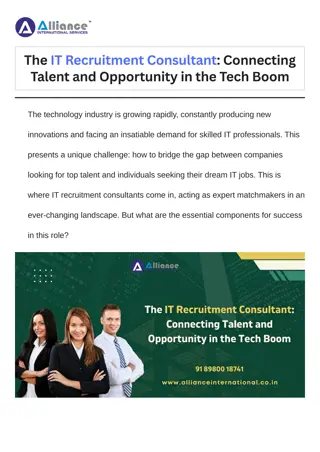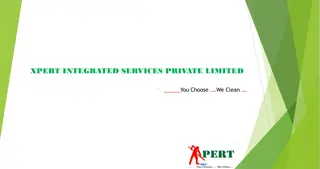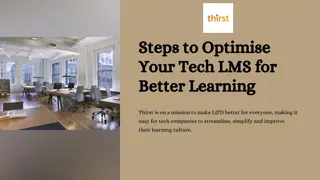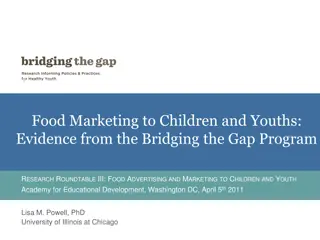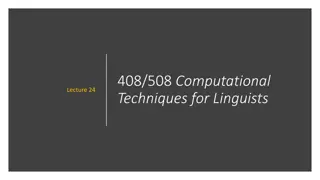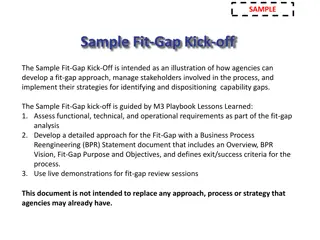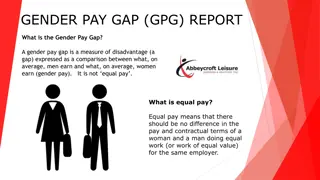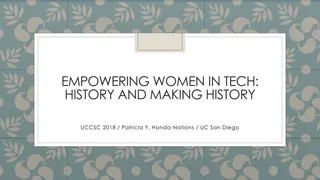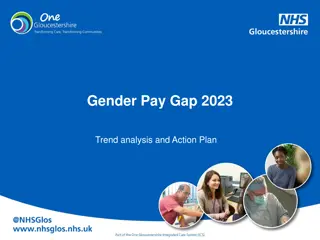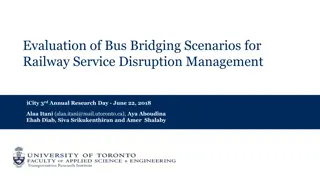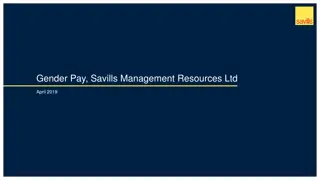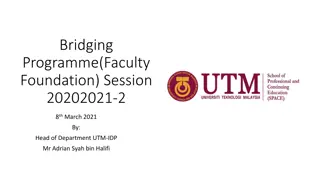Linguists in Tech: Bridging the Skills Gap
This collection of images and text showcases the journey of a linguistic professional in the tech industry, offering insights into post-graduate life choices, academic pursuits, and career transitions. From university decisions to industry exploration, the content provides a narrative of adapting non-STEM skills in a technology-driven world, culminating in a role as a Data Scientist at Five9.
Download Presentation

Please find below an Image/Link to download the presentation.
The content on the website is provided AS IS for your information and personal use only. It may not be sold, licensed, or shared on other websites without obtaining consent from the author.If you encounter any issues during the download, it is possible that the publisher has removed the file from their server.
You are allowed to download the files provided on this website for personal or commercial use, subject to the condition that they are used lawfully. All files are the property of their respective owners.
The content on the website is provided AS IS for your information and personal use only. It may not be sold, licensed, or shared on other websites without obtaining consent from the author.
E N D
Presentation Transcript
Breaking into industry with a non-STEM degree LINGUISTS IN TECH: CLOSING THE SKILLS GAP (GENEVA, 21-22 APRIL)
Pour faire quoi aprs ? LINGUISTS IN TECH: CLOSING THE SKILLS GAP (GENEVA, 21-22 APRIL)
Im hoping to marry a millionaire (But was I really?!)
Roadmap My profile My journey What I ve learnt about: Life after Uni Upskilling Industry Networking Tips to (hopefully) make your journeys less rocky.
Volleyball BA and MA in theoretical linguistics (Venice) Me, in a nutshell Doctorate in general linguistics (Geneva) 2 postdoctoral appointments (Cambridge) Services Data Scientist (Five9)
3 What to study Life after graduation Life after PhD PIVOTAL CHOICES Research Industry?
The three big choices STAYING SANE IN A CONFUSING WORLD
1. UNIVERSITY (don t listen to what people say) Will you please leave me alone??!! Pour faire quoi apr s? Don t study Spanish, German is way more useful What s the point in studying languages in university? I learnt German when I moved to Hamburg for work and I speak very well Your French is already good, why pay to study it in Uni? You are smart, you should have study to become a surgeon
1. UNIVERSITY (study what you love) Find a job that you love, and you will never have to work a day in your life (Confucius? Mark twain?) Life is what happens while you re busy making other plans (Beautiful Boy, John Lennon) A passionate historian is better than a sad mathematician
1. UNIVERSITY BA in Linguistics MA Theoretical Linguistics (Didactics) (Creole grammar) Immediate goals: Learn French and English well, work on topics you love. Professional goals: NONE. You don t have to have your whole life figured out in your 20s.
2. LIFE AFTER GRADUATION Not yet, no. Are you going to find a real job, now?! But I did try, though!
2. LIFE AFTER GRADUATION What (I thought) were my only professional choices back then Non-academic PhD had to be fully funded; had to be on Creoles. (of English) teacher; translator; proof-reader; editor? (but there s so so much more!!!!)
2. LIFE AFTER GRADUATION (looking back) Being done with school doesn t mean you re job worthy/ready. 2 main mistakes: Lack of flexibility (Doctorate in Cambridge) Common misconception that graduation = end of studies Up skilling/specializing is always a smart move!
3. LIFE AFTER A PHD: ACADEMIA PhD in Theoretical Linguistics (Northern Italian interrogative syntax) I stayed in academic research (I liked it + I thought that was my only choice) Blessed with 2 consecutive SNSF scholarships to work at the University of Cambridge
3. LIFE AFTER A PHD: ACADEMIA Precarity Lack of roots (international mobility) Overwhelming competition (600) Huge turning point
3. LIFE AFTER A PHD: INDUSTRY Tech is so cool! Why not give it a try? In Data Science, we do so much text mining and text analytics it would just make sense to have linguists in the role, why don t you give that a try (Marco De Ieso, Senior Data Scientist @ IBM)
3. LIFE AFTER A PHD: UP SKILLING ? Identification of my skill gaps (applies to me, you, STEM graduates) Retraining (Nanodegree @ Udacity + Bootcamp in ML) Experience (Open Source co-operations at Omdena, Stability AI etc.)
3. LIFE AFTER A PHD: UP SKILLING ? !!! Imposter syndrome alert !!! Are people going to want a non-STEM Graduate in a technical role?
3. LIFE AFTER A PHD RECEPTION OF MY UNUSUAL PROFILE People were thrilled to see a linguist wanting to break into DS/NLP My experience in academic research was highly appreciated No one was treating me like a junior (but you will, if you re a fresh graduate) Job opportunities came at me more than I had to look for them
3. LIFE AFTER A PHD: MY JOB AT FIVE9 Creation of IVAs My role Analysis of conversational workflows to help them shape and improve the product Research to help them improve their voice offer What I like about it Permanent and well paid Combination of my knowledge of linguistics, research skills, and the tools I learnt when upskilling I feel trusted and valued The career growth opportunities are endless
3. LIFE AFTER A PHD (looking back) Big misconception: As someone who holds a doctorate in a non-STEM discipline, academia is your only choice. No one wants to hire people with PhDs because they cost more while lacking work experience (literally everyone) No one wants to hire people with PhDs who are not able to show proactivity and readiness to learn and adapt to a different industry Up skilling/specializing is always a smart move!
Ill discuss technical roles here, but most claims apply to all possible roles (project management, human resources, etc.) Up skilling ALL THE WHENS AND HOWS AND WHYS
Why should I up skill? Regardless of your field of studies, university will have equipped you with a solid knowledge base, but little practice Some roles you ll compete for in 5 years are not even being offered as Uni degrees now (when I studied: Data Science, Data Engineering, AI Ethics ) The job market is insanely competitive practical skills will make you one of the most attractive candidates Demonstrates a pro-active mindset (highly valued!) Will allow you to compete for higher paying roles (personal: 200%)
When should I up skill? The earlier the better While you re still studying (dedicate 20% of your time to up skilling over 2/3 years this will make a HUGE impact) While you do an internship (low paying jobs are worth more in your CV than career gaps!) Depends on your personal situation (Do you need to work to finance your studies? Do you have dependents?)
How should I up skill? Identify the job you want (within reasonable means) Research the job you want Address most technical gaps (skills, certifications, experience) Acquire hands-on experience (personal projects, bootcamps, open source co-operations) As a junior aspiring for a technical role, you ll almost certainly go through rounds and rounds of technical interviews It s never too early!
Hands-on experience will boost your CV
My two cents HOW TO NAVIGATE UNI AND WORK AS A YOUNG PERSON
How to navigate Uni (and stay sane) Study what you like, not what people think is useful/sexy Market trends change quickly You don t need a degree in X to work in X If you want to do a PhD, do a PhD A PhD will make you an attractive candidate Your unique skillset will be highly valued Yes, you ll be paid more (and that s a good thing!)
How to navigate your early professional years (and stay sane) Constitutes your knowledge base, will probably determine the field you work in get a degree Makes you attractive up skill network Makes you less naive This is where opportunities come from research the market
How to navigate your early professional years (and stay sane) Don`t you ever think that holding a degree makes you job ready Upskill Acquire hands-on experience Build a presence Identify a field you want to work in / dream job (but stay flexible!) Stay humble, but know your worth Research your market value Be ready to discuss the unique set of skills that makes you a great candidate Be patient, you ll have that dream job sooner or later
My invitees LINGUISTS IN TECH: CLOSING THE SKILLS GAP (GENEVA, 21-22 APRIL)
From theoretical linguistics to ML engineering Aleksandra Verkauteren Senior Machine Learning Engineer and Head of NLP @ Metamaze 22 April 2023, 1:30pm
What does it take to work in tech today? Janine Aeberard Effi Georgala Lonneke van der Plas Linguistic Director @ Textshuttle Manager II NLP Research @ Nuance Communications Group Leader @ Idiap 22 April 2023, 1:30pm
Thank you! AND GOOD LUCK FIGURING OUT WHAT YOU WANT TO DO
